Dealing with dementia patients can often lead to a feeling of helplessness; their care is expensive and poses a challenge to society. But a start-up in Duisburg had a promising idea: students have developed a ball filled with electronics for people suffering from dementia. ichó gives people a piece of their lives back.
Video: How the ichó therapy ball brings people with dementia back into communication (KfW Group/n-tv). This video is only available in German.
It is a magical moment of fleeting happiness. An elderly woman holds a white ball in her trembling hands; at first she is fearful that she could drop the textured ball, hardly bigger than a grapefruit. Then she sees that the ball begins to light up in front of her eyes. Blue at first, the colour then changes to a warmer red. A smile flashes across the face of the woman who had just been sitting there lost in her own world, her eyes search for the others in the room.
The ball is then passed around the circle at the day clinic in Tönisvorst in the Lower Rhine region of Germany and each time it captivates whoever takes hold of it. One man holds it so tightly, it's as if he has just found a toy from his childhood. A woman gazes in awe at what the ball is doing in her lap. Sometimes the colours change, sometimes the ball emits animal sounds, sometimes it sounds like a drum set.
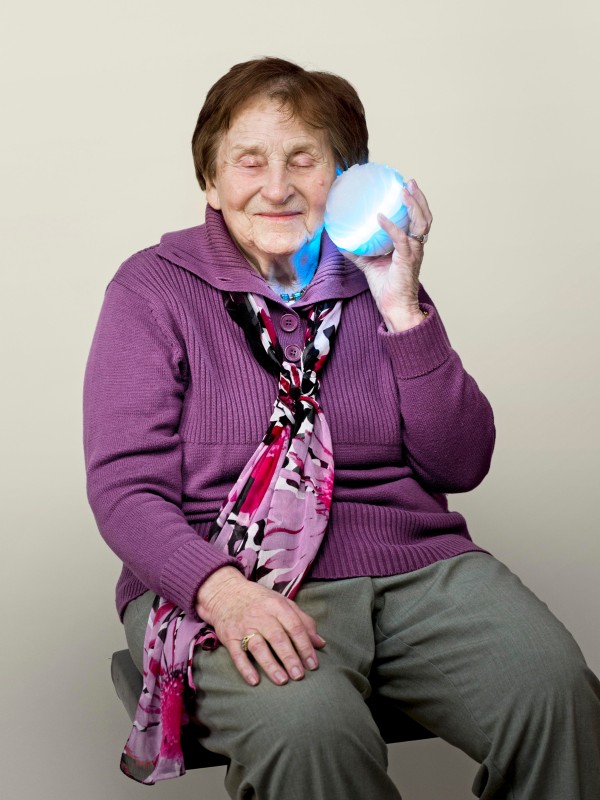
Light, sound and vibrations from the therapy ball are designed to generate a response from patients, even if just for a short moment.
The inventors christened the ball ichó, Greek for echo. In Greek mythology it was once the name of a nymph who served Zeus. The mother of the gods Hera decided to punish the nymph by only allowing her to repeat the last words said to her by others.
While the echo represented a punishment in Greek mythology, the silicone electronic-filled ball named after the nymph fulfils a completely different function: it is designed to stimulate responses from patients in the day clinic in north-west Germany. This is one of the great challenges for everyone who deals with people afflicted by dementia: to draw these patients, who are locked in their own worlds, limited in their responses and often seem frightened, out of their own thoughts and emotions and to connect with them, even if only for a moment.
"We can give these people moments," says Frauke Zimmermann, rhythmics teacher at the day clinic in Tönisvorst. With a group of dementia patients, she does movement exercises or music, memory training exercises and, more recently, has also started using prototypes of the ichó ball.
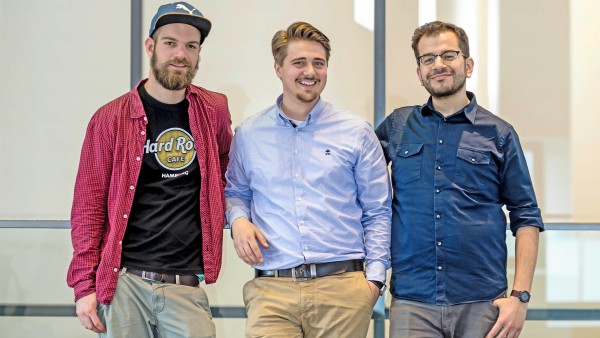
Mario Kascholke, media computer scientist (from left), and the communication designers Steffen Preuß and Eleftherios Efthimiadis.
A trio develops the therapy ball
"We are always on the lookout for new tools to stimulate people. ichó is another tool that we can offer. Many dementia patients are not just mentally impaired, they also have limited motor skills. This ball seems to remind most people of their childhood. Everyone has had contact with balls at an early age. The round and textured surface has a direct effect on people when they touch it. And the electronics hidden inside make it possible to work with light, sound and vibration, greatly increasing the different possibilities," says Zimmermann about her experiences.
ichó was conceived by three young entrepreneurs, two of whom are still Master's students at the University of Applied Sciences in Düsseldorf. In the Social Impact Lab in Duisburg-Ruhrort, which is jointly operated by the Prof. Otto Beisheim Foundation, Franz Haniel & Cie. GmbH and KfW Stiftung, the trio is about to launch a product under their own GmbH company (equivalent to a limited liability company). The prototypes have already sparked great interest among experts at trade fairs for medical products and aids.
Dealing with the growing number of dementia patients around the world – 1.6 million people are affected in Germany alone, where one in eleven over 65s has dementia – is one of the greatest challenges facing our healthcare system. For as long as there are no medical solutions to cure patients, care for dementia patients in Germany alone costs about EUR 10 billion a year.
And it is difficult to find enough caregivers who are willing to take on this strenuous work. "In view of the crisis in care services, we are constantly looking for ways in which the development of electronics and artificial intelligence can help us in our work," says Philipp Hünersdorf, Managing Director of Artemed Pflegezentren. This chain of care centres has 550 beds in Germany, 85 per cent of which are occupied by dementia patients.
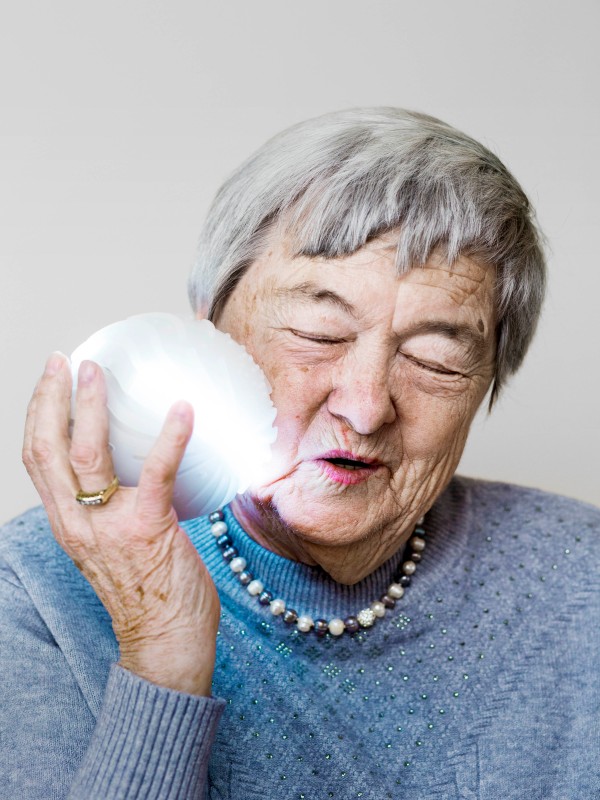
The ichó ball can also play the voices of the patient's loved ones or their favourite music.
How patients benefit from the ball
"For a while now, there have been tablets available on the market that dementia patients can use. But this doesn't really work. As far as I can tell, the ichó ball has quite the opposite effect. We're just waiting for it to go into production so we can use it."
Hünersdorf, an economist, isn't just concerned with keeping residents in the homes busy and stimulated. Many people with dementia can be extremely agitated. This makes it difficult to deal with them. Washing, even combing their hair can quickly become torturous for the patient as well as the caregiver. "Giving them a ball to play with that stores their favourite music or plays the voices of their relatives is a great comfort," says Philipp Hünersdorf.
If the three founders – the communication designers Eleftherios Efthimiadis and Steffen Preuß and the electrical engineer and media computer scientist Mario Kascholke – succeed in starting production of the balls sometime this year, their success will not just be down to the support of their university, the Duisburg Lab, KfW Stiftung and their own untiring commitment. It has at least as much to do with the fact that all three had very personal reasons for engaging so intensively with dementia and the consequences of this disease. The grandmothers of Efthimiadis and Preuß both slid into dementia in old age, for Kasholke it was his grandfather, thus beginning a long process in search of how to interact with these people and make their lives easier.
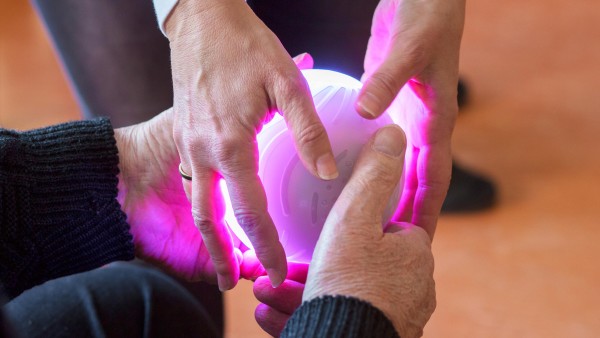
Balls are an essential therapy tool for treating those suffering from dementia — and the basis for the electric version.
Efthimiadis began full-fledged field research. He visited kindergartens, schools and homes for children and adults with cognitive impairments. He learned about basal communication, the curative educational concept of physical contact with people with whom communication via language is not or no longer possible. It focuses on physical contact, massage, touching and feeling, to interact with patients. The communication designer looked at the tools used to work with these patients. That's how he finally came up with devices that generated noise, and he hit on the ball as a core tool of therapy.
In order to further develop these ideas, he teamed up with Steffen Preuß. "It wasn't just the idea that made sense to me," says Steffen Preuß. "What we're doing here connects me to my grandmother now that she has passed away."
Both then brought in Mario Kascholke, who implemented the ideas from a technical standpoint. Meanwhile, they have found companies to make the moulds for the silicone balls and produce the mother boards, the brains of the ball. They are discussing patenting their idea with lawyers. The goal now is to identify investors so that the project can turn into a business.
The next stage of development
"What is interesting about our ichó demos is that people who work with dementia patients are excited about our product's potential and can hardly wait to use the first balls in their homes and day clinics. The people who haven't experienced dementia – like professional investors – often cannot really imagine what a glowing ball with noises represents in terms of progress," says Steffen Preuß. Eleftherios Efthimiadis adds: "When dealing with people suffering from dementia, you first have to learn that they respond differently."
The trio already achieved a major accomplishment when the Federal Ministry for Economic Affairs and Energy nominated them for the "Ideas from Europe" start-up competition. After making it through the preliminary round in Tallinn, they are competing in the final in The Hague in April. But the team is already thinking one step beyond. They dream of being able to provide each patient with a customised ball that is tailored to personal interests and preferences and that can be adapted to each phase of the disease.
The writer Arno Geiger described his father's dementia and his own way of dealing with the disease in the book "Der alte König in seinem Exil" (The Old King in His Exile). "Alzheimer's exposes healthy people to the complexity of the skills needed to cope with everyday life. At the same time, Alzheimer's is a symbol of the state of our society. We've lost sight of the big picture; continuous innovations create orientation problems and fears about the future. Talking about Alzheimer's means talking about the disease of the century." In this sense, ichó could be a small technical step towards improving the way we deal with it, for the benefit of patients and society alike.
Follow up
Thanks to investment by Business Angels, it has been possible to develop the prototype for market launch. The therapy ball is now approved as a medical product and has been available to commercial and private customers through the company’s online store since April 2020. It is exclusively manufactured in Germany, “from the circuit board to the outer shell,” explains founder Steffen Preuss proudly. The founding team has grown as well: it has been joined by AlkjeStuhlmann, who takes care of icho systems’ finances.
Customer feedback is still a great motivator for the young company. “We are often really touched when messages reach us from family members who have been able to experience deeply moving moments with relatives again after a long time. A mother who suddenly starts speaking again, briefly remembers individual moments in her life or starts to sing. It is really emotional,” says Preuss.
As well as dementia sufferers, they have added new target groups. ichó is currently working on applications and treatment concepts for autistic children and is in a testing phase. The therapy ball may also be useful for children with learning difficulties or mental disabilities, for rehabilitation after a stroke or in therapy for people with depression.
The coronavirus crisis really put the brakes on the company’s plans for 2020. Trade fairs and events were cancelled and the product could not be presented to a wider audience, as had been the hope. Steffen Preuss regrets that – and not just from a business perspective: “In facilities where visiting was limited during lockdown, levels of isolation grew, along with unrest among the residents.” In contrast, facilities that were already working with ichó provided feedback to the company about how much the therapy ball was helping with feelings of isolation at this difficult time.
Published on KfW Stories: 17 April 2018, last updated 20 November 2022.
The described project contributes to the following United Nationsʼ Sustainable Development Goals
Goal 3: Ensure healthy lives and promote well-being for all at all ages
Health is the goal, prerequisite and result of sustainable development. Supporting health is a humanitarian requirement – both in developed and developing countries. Around 39 per cent of the worldʼs population lives without health insurance. In poor countries, this amount even exceeds 90 per cent. Many people still die from diseases that are not necessarily fatal with the right treatment, or that could easily be prevented with vaccinations. Strengthening health systems, particularly by making vaccines widely available, can make it possible for us to drive these diseases back and even eradicate them by 2030.

All United Nations member states adopted the 2030 Agenda in 2015. At its heart is a list of 17 goals for sustainable development, known as the Sustainable Development Goals (SDGs). Our world should become a place where people are able to live in peace with each other in ways that are ecologically compatible, socially just, and economically effective.

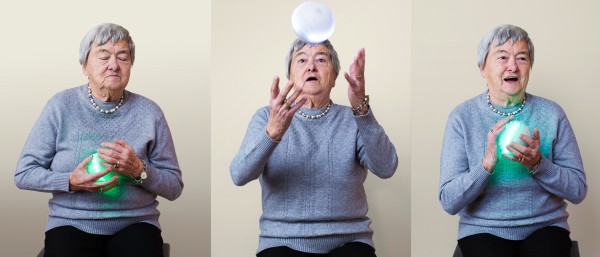
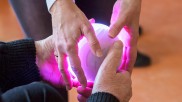


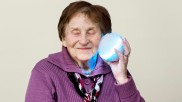

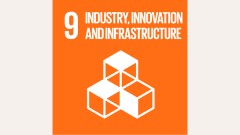

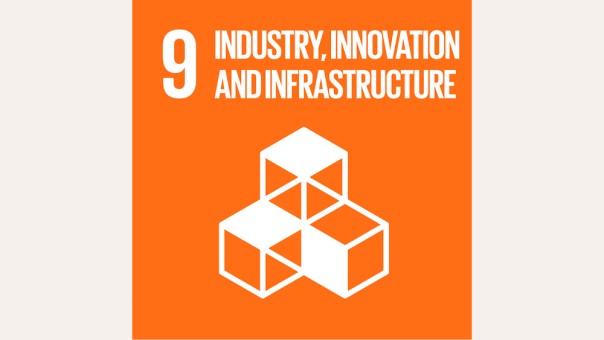
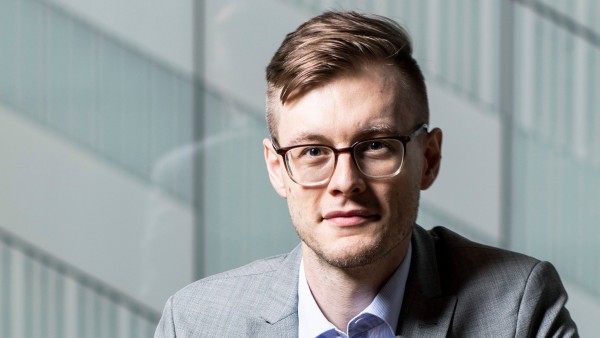
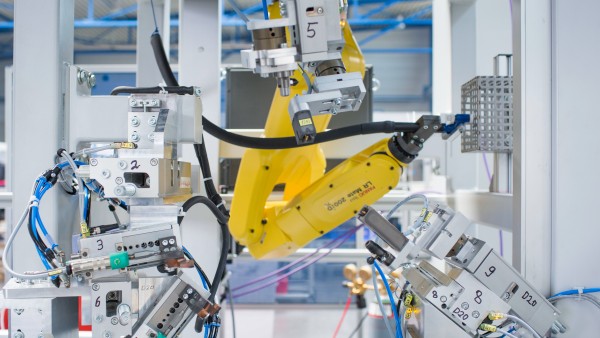
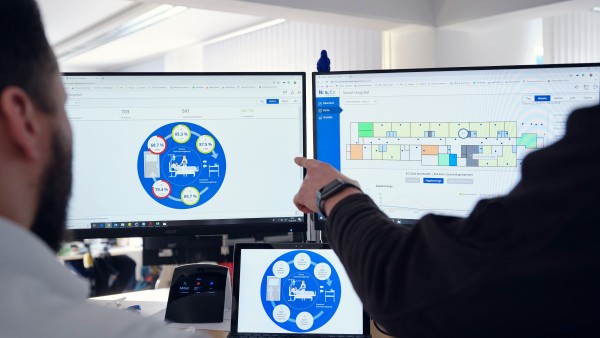
Data protection principles
If you click on one of the following icons, your data will be sent to the corresponding social network.
Privacy information